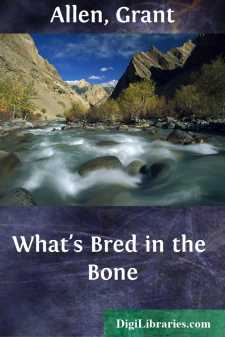Categories
- Antiques & Collectibles 13
- Architecture 36
- Art 48
- Bibles 22
- Biography & Autobiography 813
- Body, Mind & Spirit 142
- Business & Economics 28
- Children's Books 17
- Children's Fiction 14
- Computers 4
- Cooking 94
- Crafts & Hobbies 4
- Drama 346
- Education 46
- Family & Relationships 57
- Fiction 11829
- Games 19
- Gardening 17
- Health & Fitness 34
- History 1377
- House & Home 1
- Humor 147
- Juvenile Fiction 1873
- Juvenile Nonfiction 202
- Language Arts & Disciplines 88
- Law 16
- Literary Collections 686
- Literary Criticism 179
- Mathematics 13
- Medical 41
- Music 40
- Nature 179
- Non-Classifiable 1768
- Performing Arts 7
- Periodicals 1453
- Philosophy 64
- Photography 2
- Poetry 896
- Political Science 203
- Psychology 42
- Reference 154
- Religion 513
- Science 126
- Self-Help 84
- Social Science 81
- Sports & Recreation 34
- Study Aids 3
- Technology & Engineering 59
- Transportation 23
- Travel 463
- True Crime 29
Grant Allen
Grant Allen was a Canadian science writer, novelist, and advocate of evolutionary theory in the late 19th century. He is best known for his mystery novel "The Woman Who Did" (1895), which explored controversial themes of women's rights and social norms. Allen's extensive body of work also included scientific essays and popular fiction, contributing significantly to both literary and scientific communities of his time.
Author's Books:
Sort by:
by:
Grant Allen
THE STRUGGLE FOR LIFE AMONG LANGUAGES. A distinguished Positivist friend of mine, who is in most matters a practical man of the world, astonished me greatly the other day at Venice, by the grave remark that Italian was destined to be the language of the future. I found on inquiry he had inherited the notion direct from Auguste Comte, who justified it on the purely sentimental and unpractical ground...
more...
by:
Grant Allen
CHAPTER I. THE ORIGIN OF THE ENGLISH. At a period earlier than the dawn of written history there lived somewhere among the great table-lands and plains of Central Asia a race known to us only by the uncertain name of Aryans. These Aryans were a fair-skinned and well-built people, long past the stage of aboriginal savagery, and possessed of a considerable degree of primitive culture. Though mainly...
more...
by:
Grant Allen
THE ADVENTURE OF THE CANTANKEROUS OLD LADY On the day when I found myself with twopence in my pocket, I naturally made up my mind to go round the world. It was my stepfather's death that drove me to it. I had never seen my stepfather. Indeed, I never even thought of him as anything more than Colonel Watts-Morgan. I owed him nothing, except my poverty. He married my dear mother when I was a girl at...
more...
by:
Grant Allen
CHAPTER I. ELMA'S STRANGER. It was late when Elma reached the station. Her pony had jibbed on the way downhill, and the train was just on the point of moving off as she hurried upon the platform. Old Matthews, the stout and chubby-cheeked station-master, seized her most unceremoniously by the left arm, and bundled her into a carriage. He had known her from a child, so he could venture upon such...
more...
by:
Grant Allen
THE EPISODE OF THE MEXICAN SEER My name is Seymour Wilbraham Wentworth. I am brother-in-law and secretary to Sir Charles Vandrift, the South African millionaire and famous financier. Many years ago, when Charlie Vandrift was a small lawyer in Cape Town, I had the (qualified) good fortune to marry his sister. Much later, when the Vandrift estate and farm near Kimberley developed by degrees into the...
more...
by:
Grant Allen
I. Mrs. Dewsbury's lawn was held by those who knew it the loveliest in Surrey. The smooth and springy sward that stretched in front of the house was all composed of a tiny yellow clover. It gave beneath the foot like the pile on velvet. One's gaze looked forth from it upon the endless middle distances of the oak-clad Weald, with the uncertain blue line of the South Downs in the background....
more...
by:
Grant Allen
FALLING IN LOVE An ancient and famous human institution is in pressing danger. Sir George Campbell has set his face against the time-honoured practice of Falling in Love. Parents innumerable, it is true, have set their faces against it already from immemorial antiquity; but then they only attacked the particular instance, without venturing to impugn the institution itself on general principles. An old...
more...
by:
Grant Allen
INTRODUCTION Which every reader of this book is requested to read before beginning the story. This is a Hill-top Novel. I dedicate it to all who have heart enough, brain enough, and soul enough to understand it. What do I mean by a Hill-top Novel? Well, of late we have been flooded with stories of evil tendencies: a Hill-top Novel is one which raises a protest in favour of purity. Why have not...
more...
by:
Grant Allen
I. LETTER-WRITERS. Since old Leisure died, we have come to think ourselves altogether too fine and too busy to cultivate the delightful art of correspondence. Dickens seems to have been almost the last man among us who gave his mind to letter-writing; and his letters contain some of his very best work, for he plunged into his subject with that high-spirited abandonment which we see in...
more...
by:
Grant Allen
CHAPTER I. UNA CALLINGHAM'S FIRST RECOLLECTION It may sound odd to say so, but the very earliest fact that impressed itself on my memory was a scene that took place—so I was told—when I was eighteen years old, in my father's house, The Grange, at Woodbury. My babyhood, my childhood, my girlhood, my school-days were all utterly blotted out by that one strange shock of horror. My past life...
more...











